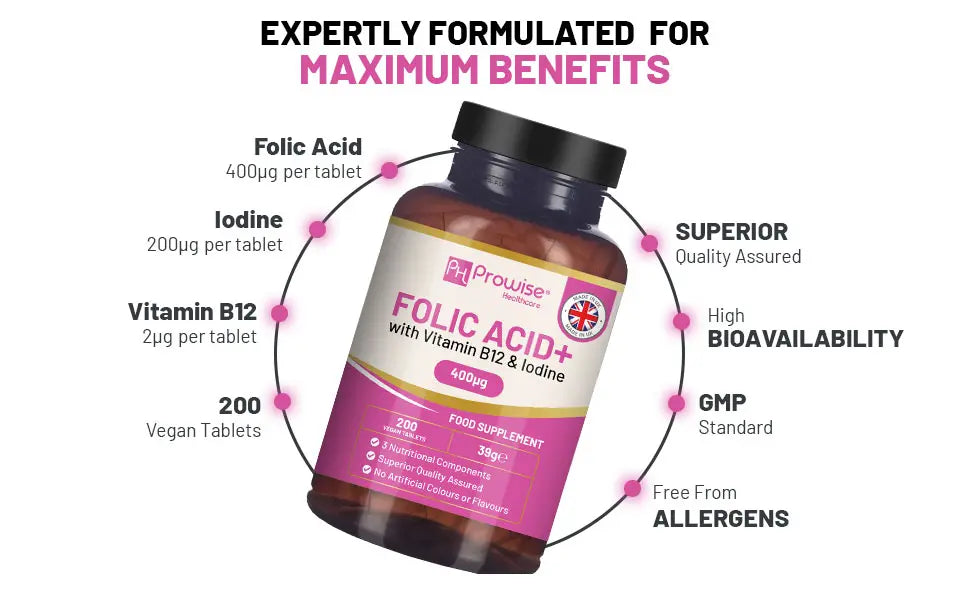In this blog, we'll delve into the essential role of folic acid for pregnancy, exploring why it's a key player in maintaining good health, how much you need, and practical ways to ensure you're meeting your daily requirements.
What Is Folic Acid And Why Do Expecting Mothers Need It?
Folic acid, also known as folate or vitamin B9, is a water-soluble vitamin that plays a pivotal role in several vital bodily functions. This B-vitamin plays a crucial role in the early stages of foetal development.
Adequate folic acid intake significantly reduces the risk of neural tube defects in the developing baby. Moreover, it is linked to lowering the risk of preterm births by up to 70%, making it an essential component of any prenatal care routine.
Cell Division and DNA Synthesis
Folic acid is a key player in cell division and DNA synthesis during periods of rapid growth, such as pregnancy. Adequate folic acid levels support the formation of new cells and help prevent DNA mutations.
Red Blood Cell Formation
Folic acid is instrumental in the production of red blood cells in pregnant women. A deficiency in this vitamin can lead megaloblastic anaemia which is characterized by larger-than-normal red blood cells that don't function effectively.
Neural Tube Development in Pregnancy
Folic acid during pregnancy is essential for the proper development of the foetal neural tube. Sufficient intake helps prevent neural tube defects, which can have serious implications on the baby's spinal cord and brain.
Mood Regulation
Folic acid also plays a role in neurotransmitter synthesis, including serotonin and dopamine. These neurotransmitters are crucial for mood regulation, and a deficiency in folic acid may contribute to mood disorders.

How Much Folic Acid Do You Need?
Ensuring an adequate intake of folic acid during pregnancy is vital for maintaining optimal health. For expectant mothers, the recommended daily intake of folic acid is 600 micrograms. This ensures robust support for both the mother's well-being and the intricate development of the growing baby, especially during the critical first trimester when the neural tube is taking form.
Natural Sources of Folic Acid
Fortunately, incorporating folic acid during pregnancy into your diet is relatively easy, as it is found in a variety of foods. Some excellent natural sources include:
- Leafy Greens: spinach, kale, and broccoli
- Legumes: lentils, chickpeas, and black beans
- Citrus Fruits: oranges, grapefruits, and lemons
- Fortified Grains: cereals and breads that are fortified with folic acid
- Avocado
While a balanced diet is the primary source of folic acid, pregnant women and those planning to conceive are often advised to take folic acid supplements to reduce the risk of neural tube defects. With Prowise Folic Acid+, expecting mothers can meet their recommended daily folic acid intake and nurture their little one throughout pregnancy.
Why Prowise Folic Acid+?
Prowise Folic Acid+ is a high-strength folic acid supplement that goes beyond conventional prenatal care. With 400 micrograms of folic acid, coupled with vitamin B12 and iodine, this folic acid supplement is tailor-made to support maternal tissue growth and ensure optimal foetal development.
Fortified with vitamin B12 and iodine, this folic acid supplement enhances cognitive clarity, fortifies the immune system, and supports thyroid function.
From preconception to the precious moment of delivery, let Prowise Folic Acid+ nurture both you and your baby's health throughout the remarkable journey of pregnancy.
Buy Now
Final Thoughts
Folic acid is a powerhouse nutrient with far-reaching effects on prenatal health. While natural sources of this B-vitamin go a long way in helping expecting mothers reach their daily intake, incorporating folic acid supplements like Prowise Folic Acid+ into your prenatal routine transcends the basics, providing you and your baby with the essential nutrients needed for a healthy and thriving pregnancy.

